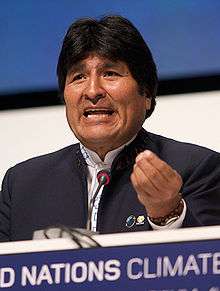Post-neoliberalism
Post-neoliberalism is a term used to describe ideals that go against the Washington Consensus and neoliberalism.[1] The movement is particularly strong in Latin America, where the left-wing Pink Tide has had an influence on politics in the region. According to Roger Merino examples of Post-neoliberal governments include the government of Evo Morales in Bolivia and the government of Rafael Correa in Ecuador.[2] In the economic arena, the ideology advocates for the nationalization of numerous industries, and for the redistribution of wealth.
History

The idea of post-neoliberalism arose during the Pink Tide, where left-wing Latin American critics of neoliberalism like Hugo Chavez and Evo Morales were thrust into power in the 1990s and 2000s. While the ideas of post-neoliberalism aren't unique to Latin America, they are largely associated with the region.[3]
According to researchers, the election of Hugo Chavez as President of Venezuela in 1999 marked a definite start of the Pink Tide and post-neoliberal movement. Since then, Evo Morales, Néstor Kirchner, Rafael Correa, and numerous other leaders associated with the post-neoliberal movement were elected in Latin America.
Ideology
Post neoliberalism seeks to fundamentally change the role of the state in countries where the Washington Consensus once prevailed.[4] To do this, many post-neoliberal leaders advocate for the nationalization of multiple industries, most notably the oil and gas industries and mining industries.[5] Post-neoliberalism also advocates for the implementation of more numerous welfare benefits and more government action towards reducing poverty. Post neo-liberalism advocates for more state intervention in the economy, as seen in countries like Venezuela and Bolivia.[6]
Criticisms
Post-neoliberalism has drawn criticism from both the left and right of the political spectrum. Right-wing critics have claimed that post-neoliberalism is vague and populistic. They also claim that it harms international investment and economic development.[7]
References
- ↑ Öniş, Ziya; Şenses, Fikret (November 2003). "Rethinking the Emerging Post-Washington Consensus: A Critical Appraisal" (PDF). ERC Working Papers in Economics. 03 (09). Ankara: Middle Eastern Technical University. Retrieved 27 August 2016.
- ↑ Merino, Roger (2011). What is ‘Post’ in Post-Neoliberal Economic Policy? Extractive Industry Dependence and Indigenous Land Rights in Bolivia and Ecuador
- ↑ "http://eprints.soton.ac.uk">Grugel, Jean: Post-neoliberalism in Latin America: Rebuilding and Reclaiming the State after Crisis
- ↑ "palgrave.com"Wylde, Christopher: Latin America After Neoliberalism
- ↑ http://venezuelanalysis.com/tag/nationalization
- ↑ "http://muse.jhu.edu">Kaltwasser, Cristóbal: Toward Post-Neoliberalism in Latin America
- ↑ http://papers.ssrn.com/sol3/papers.cfm?abstract_id=1938677